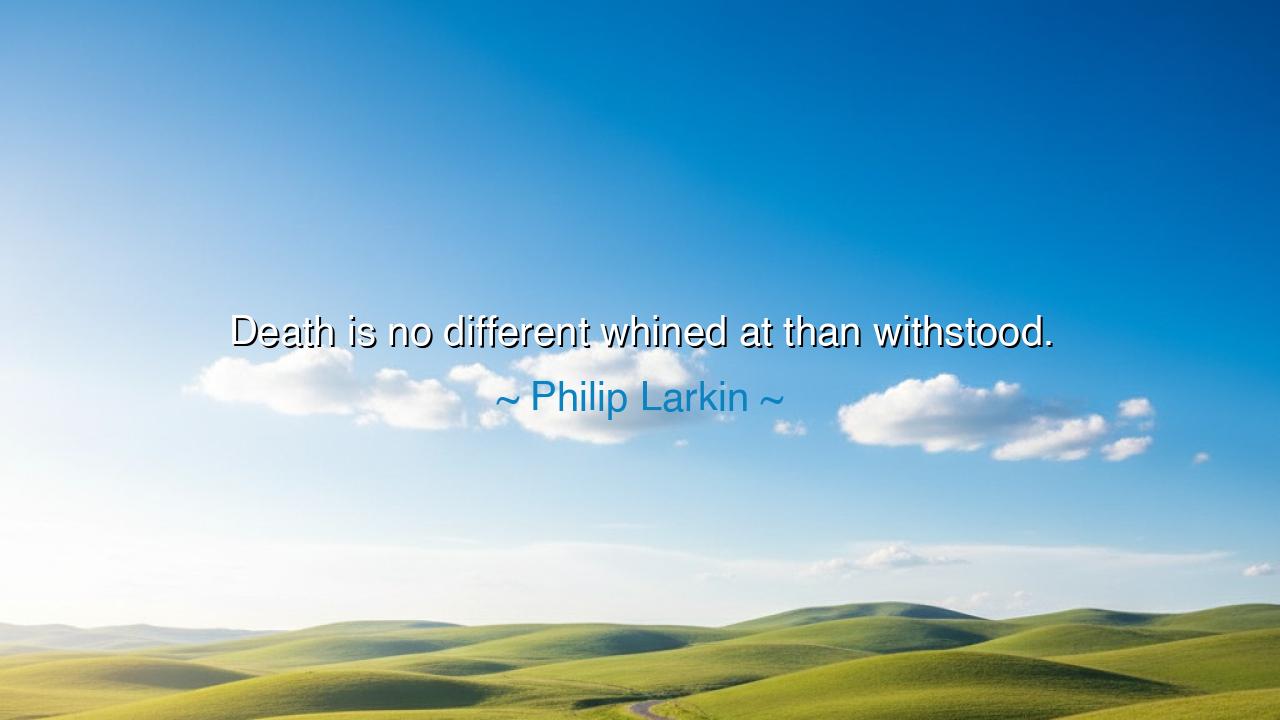
Death is no different whined at than withstood.






“Death is no different whined at than withstood.” Thus wrote Philip Larkin, the English poet whose words stripped life of illusion and yet, paradoxically, revealed its deepest truths. In this brief and piercing line, he speaks not only of death, but of courage, dignity, and the futility of despair. Death, he reminds us, is unmoved by our fear and untouched by our pleading. To whine at it — to shrink, to weep, to beg — changes nothing. It comes all the same, quiet and certain. But to withstand it — to face it in stillness and strength — is to preserve one’s humanity in the face of the inevitable. Death remains the same, yet how we meet it defines who we are.
The origin of this quote lies in Larkin’s poem Aubade, one of his most haunting meditations on mortality. Written in the late years of his life, the poem wrestles with the terror of death — not the drama of dying, but the quiet knowledge that one day, consciousness will cease. Larkin was not a man of faith; he found no comfort in heaven, no solace in eternal return. And yet, in this line, he discovers a kind of stoic truth — that lamenting the inevitable does not lessen its weight. It is a truth that echoes the wisdom of the ancients: the wise man accepts what cannot be changed, and acts with calm in the face of fate.
When Larkin says “death is no different whined at than withstood,” he speaks to the timeless struggle of the human spirit against despair. The weak heart may curse the darkness, but the brave one lights a candle within it. Death, like the turning of the seasons or the setting of the sun, is part of the great design. To rage against it endlessly is to waste the time we have; to meet it with acceptance is to reclaim our power from fear. For the hour of death is not ours to choose — but the manner of our living until then is. And in that living, courage becomes a kind of immortality.
The ancients understood this well. The Stoic philosophers, from Epictetus to Marcus Aurelius, taught that death is neither good nor evil — it is simply natural. What matters is not its coming, but our attitude toward it. Marcus wrote, “You could leave life right now. Let that determine what you do, say, and think.” To live with the awareness of death is not to be haunted by it, but to be sharpened by it — to love more deeply, to act more justly, to speak more truly. Larkin’s wisdom, though born of melancholy, carries this same flame: if death is unchangeable, then let us not waste life trembling before it.
Consider the example of Socrates, who, when condemned to death by his city, drank the hemlock without protest. He spoke to his followers with serenity, reminding them that the soul’s journey is not ended by the body’s fall. “To fear death,” he said, “is to think ourselves wise when we are not, for we do not know whether death is not the greatest blessing.” Though Larkin did not share Socrates’ faith in the soul’s immortality, he shared his understanding of the uselessness of fear. Death comes; it cannot be bargained with. Whether one cries or stands silent, the end is the same — but the spirit that endures it with grace transcends its own mortality.
In truth, Larkin’s line is not a hymn to death, but a call to live nobly. For if whining and withstanding lead to the same end, then the only thing that matters is how we spend our days before that end arrives. Will we waste them in anxiety, or use them to build something beautiful? Will we fill our hearts with dread, or with gratitude? Death equalizes all men — but life distinguishes them. The one who meets fate without fear leaves behind not just memories, but meaning.
The lesson, then, is this: meet the inevitable with strength, and meet the uncertain with faith. Do not waste your breath lamenting what cannot be changed, nor your heart fearing what cannot be avoided. Instead, pour your energy into the living — into love, art, kindness, and truth. When the end comes, let it find you standing, not cowering; calm, not panicked; grateful, not grasping. To withstand death is not to deny its power — it is to deny it the victory of stealing your peace.
So remember the words of Philip Larkin: “Death is no different whined at than withstood.” These are not the words of a cynic, but of a man who has seen the horizon clearly. Take them as a torch for your journey. Do not fear the end, for fear adds nothing to life and takes much away. Live with dignity, love without measure, and when your time comes, face it as one who knows — that though death claims the body, the courage of the soul endures forever in the memory of those who remain.






AAdministratorAdministrator
Welcome, honored guests. Please leave a comment, we will respond soon